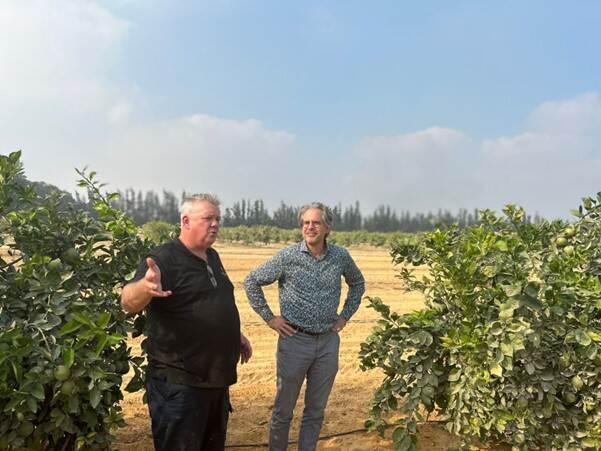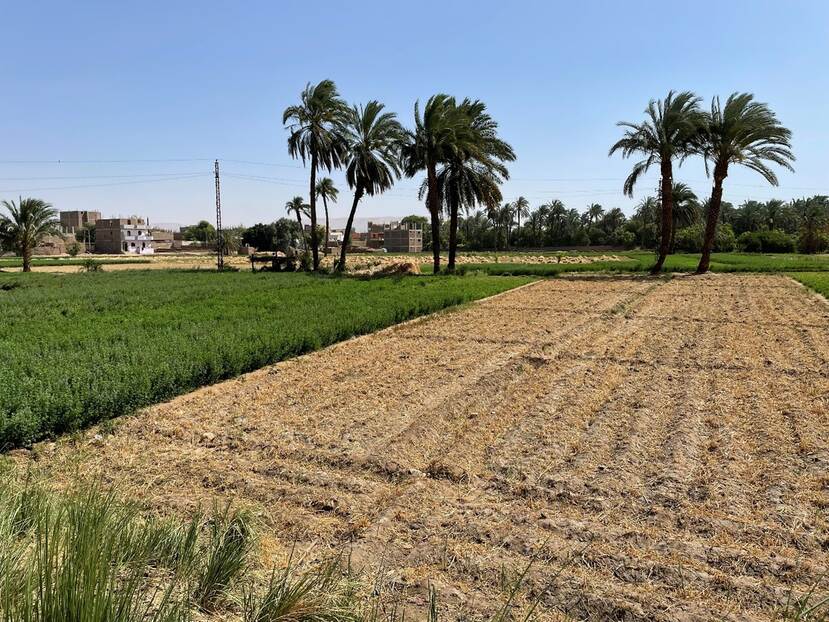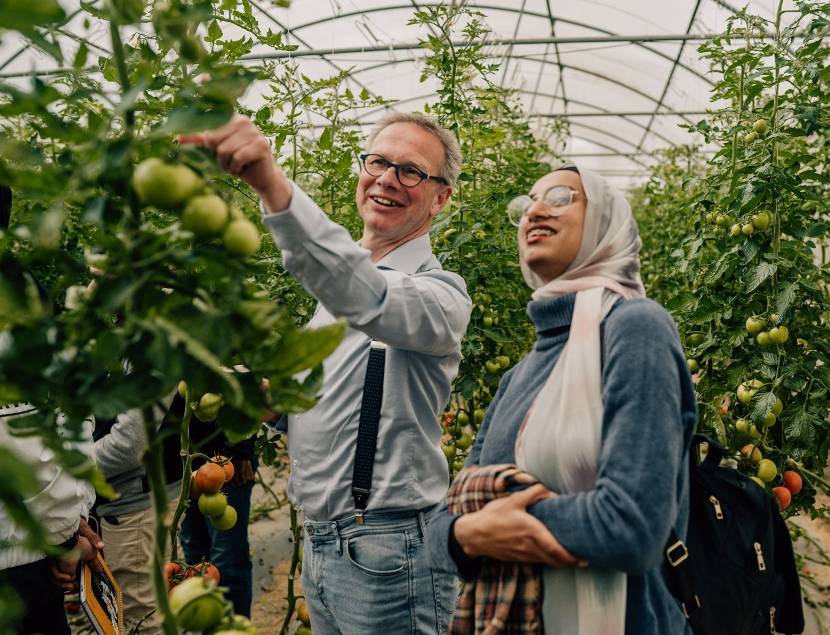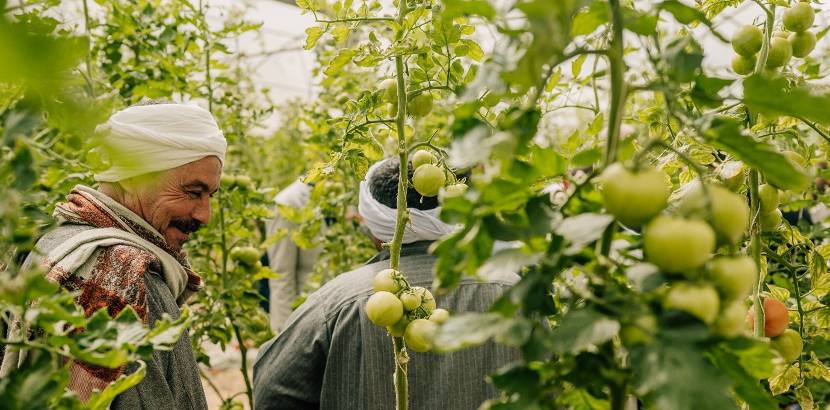Impact Clusters in Egypt: Harnessing Collaboration for Sustainable Growth
Egypt’s agricultural sector stands at a crossroads, with large expansion of agricultural land for food security and export, while heavily challenges by water scarcity, soil degradation, and fragmented landholdings. The agricultural sector contributes significantly to employment and GDP, with estimates ranging from 18–30% of employment and around 12% of GDP, depending on the methodology used, making it central to Egypt’s economic and social stability. To unlock this potential, innovative solutions and partnerships are essential.
The Netherlands is very engaged with Egypt in its agricultural development. This Dutch interest is focused on both increasing trade and investment-relationships as well as developing a socially and environmentally sustainable food system. One promising approach to combine these interests is through ‘Impact Clusters’ – project-based collaborative initiatives that bring together Dutch innovation and Egyptian expertise to create sustainable solutions tailored to local needs. These collaborations aim to address key agricultural challenges while fostering sustainable development.
This article presents three recently approved Impact Clusters in Egypt: RootGrow, BUCRA (Building Unity for Climate Resilient Agriculture) and the SOPH (Sustainable Operational Protected Horticulture) Center.
For more on the framework and global principles of impact clusters, please check: Impact Cluster Website (RVO).
What Are Impact Clusters, and Why Egypt?
Impact clusters are more than development projects; they are structured partnerships designed to deliver sustainable change. By bringing together businesses, knowledge institutes, and local stakeholders, these clusters aim to address sector-specific issues in developing countries while creating economic opportunities for Dutch companies.
What sets impact clusters apart is their dual focus. They aim not only to solve local challenges but also to create commercial opportunities, blending innovation with long-term investment. In Egypt, a country with immense agricultural potential yet persistent challenges, this approach is particularly valuable.
“These projects have the potential of bringing lasting impact to local communities and the environment by introducing sustainable, future oriented practices and business conduct within a clear business rationale.” - Tycho Vermeulen, Agricultural Counselor to Egypt and Jordan
A Closer Look at Egypt’s Approved Impact Clusters
RootGrow Cluster: Resilient Solutions for Saline Soils
In Egypt, salinity is one of the most pressing agricultural challenges. Many farmers struggle with reduced yields and soil degradation due to high salt levels in the water and soil. The RootGrow Cluster offers a practical, science-backed solution: saline-resistant rootstocks.
These rootstocks enable crops to thrive in challenging conditions, improving both yield and water efficiency. The project also emphasizes training, equipping farmers with the knowledge to use these techniques effectively. Women and youth are integral to this initiative, with dedicated programs to ensure they play a central role in the sector’s transformation.
“Sustainable agriculture starts with practical solutions. By introducing resilient rootstocks and sharing knowledge, we support Egyptian farmers to improve yields and use water efficiently. Plus, we empower women and youth to play a vital role in agriculture. In this way, we help Egypt farmers to build a stronger future for their land and communities”. – Sven Thomas, Jaguar The Fresh Company

BUCRA - Building Unity for Climate Resilient Agriculture
This Impact Cluster addresses challenges with increased salinity, climate change and land fragmentation in open field agriculture. In Arabic, بكرة (pronounced as Bucra), means tomorrow, with an implication of “the future”. BUCRA has been chosen as name for the impact cluster as the agriculture sector in Egypt needs to prepare for the future. To be prepared for the future, farmers need to collaborate more (building unity) and start using better farming techniques and water management to anticipate and prepare for, as well as adapt to, absorb, and recover from the impacts of changes in climate and extreme weather (climate resilient agriculture).
The Impact Cluster BUCRA (Building Unity for Climate Resilient Agriculture) focusses on improving knowledge, expertise, or technology. Enhancing this will indirectly lead to a chain reaction within the agricultural sector resulting in improvements to all other bullet points, namely the creation of direct or indirect sustainable long-term jobs, improving local enterprises’ business cases, and promoting the creation of new enterprises.
“BUCRA represents more than an agricultural initiative—it is a Dutch-Egyptian collaboration supporting smallholder farmers. With our inception report now complete, we are excited for the next three years! As we implement hybrid learning, smart irrigation tools, and a ‘lighthouse’ demonstration farm, we aim to create a scalable agricultural development plan that can be replicated across Egypt.” – Nazly Abd El Rahman, Netherlands-African Business Council (NABC)

SOPH Center: Advancing Protected Horticulture
Protected horticulture—growing crops in controlled environments like greenhouses—has become a national priority for Egypt (100,000 Greenhouses Project). As part of a large-scale government initiative, over 5,000 greenhouses have already been developed across five strategic locations, covering more than 8,000 hectares.
However, many local operations still face challenges such as outdated technology and limited expertise. The Sustainable Operational Protected Horticulture (SOPH) Center was approved as an impact cluster to address these gaps. It will serve as a hub for training, demonstration, and research, introducing advanced Dutch greenhouse technologies tailored to Egypt’s conditions. From precision irrigation to sustainable pest management, the center aims to equip local growers with the tools to improve productivity and resilience.
A strong basis for this initiative was provided by Delphy, a key project partner, which conducted a market study for the Netherlands Enterprise Agency (RVO) on protected horticulture in Egypt. This research identified key challenges and opportunities, shaping SOPH’s tailored approach. By bringing together Dutch and Egyptian expertise, the center supports the long-term development of Egypt’s greenhouse sector.
“In my opinion, protected horticulture on a large scale is still relatively new to Egypt. The SOPH Center brings together 10 partners from the Netherlands and Egypt, combining the expertise needed to strengthen Egypt’s greenhouse sector and support its ambitious national project to establish and operate 100,000 greenhouses, all while leveraging Dutch know-how in protected horticulture” – Ali Salah, Manager Delphy team Egypt.

Building Bridges for Growth and Innovation
Impact clusters like RootGrow, BUCRA and SOPH illustrate a vision of how collaboration can unlock potential in Egypt’s agricultural sector. While still in the early stages, their approval signals a commitment to tackling systemic challenges with innovative solutions.

As Egypt and the Netherlands deepen their partnership, impact clusters offer a blueprint for sustainable collaboration—one that balances commercial opportunity with local empowerment. For the Netherlands, they create pathways to new markets and business opportunities, while for Egypt, they bring access to cutting-edge technologies and knowledge that can drive long-term growth and resilience.